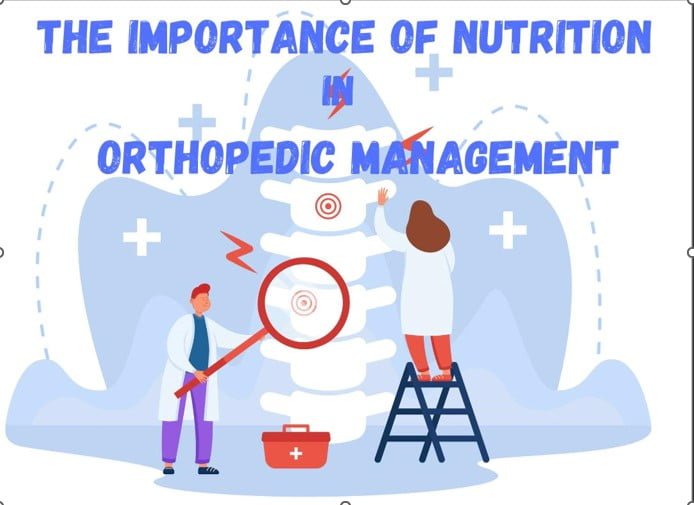Nutrition’s Role in Orthopedic Management for Primary Care Physicians
by Abdul Aziz Mondal Startups Published on: 10 April 2023 Last Updated on: 25 September 2024

Primary care physicians are responsible for the overall health and well-being of their patients. It is their duty to provide the patients with the best possible care. One area that is often overlooked in orthopedic management is the role that nutrition plays in keeping bones and joints healthy.
Did you know that the food we eat plays an important role in keeping our bones and joints healthy? When it comes to orthopedic management, nutrition is key. Our article explains why nutrition in Orthopedic Management is important. Stay tuned to learn more.
What Is A Primary Care Physician?
A primary care physician or a general physician is basically your go-to doctor. They’re the ones you see for regular check-ups, when you’re feeling sick, or when you have health concerns. They are like the leader or the main person who manages and directs your healthcare.
A primary care physician is responsible for managing a patient’s health and well-being. They help you keep up with preventive care, exams, and vaccinations to avoid health problems.
They also help you manage chronic conditions like diabetes or high blood pressure. They can help you by working with you to develop a treatment plan that fits your specific needs.
So now that you know what is a primary care physician. Essentially, they’re the ones you turn to for all your health-related questions and concerns, and they’re here to support you every step of the way. Understanding the role of nutrition in orthopedic management is crucial for primary care physicians to optimize patient outcomes. Now, let’s discuss the role of nutrition in orthopedic management. Let’s get started!
The Role Of Nutrition In Orthopedic Management

Nutrition is important for our bones and joints! When it comes to orthopedic management, the food we eat is super important. Eating a healthy diet with the right nutrients can help keep our bones and joints strong and healthy.
So what are some of the essential nutrients we need for orthopedic health?
- Calcium is super important for building and maintaining strong bones. You can find calcium in foods like milk, cheese, and yogurt, as well as in leafy greens like kale and spinach.
- Vitamin D helps our bodies absorb calcium, which makes it a crucial part of bone health. You can get vitamin D from spending time in the sun, but it’s also found in foods like fatty fish, egg yolks, and fortified cereals.
- Fruits and vegetables are also really important for orthopedic health. They’re full of antioxidants and anti-inflammatory compounds that lower inflammation and promote healing. So, be sure to load up on those leafy greens, berries, and other colorful fruits and veggies!
Incorporating Nutrition Into Patient Care Plans
It’s important to ensure that patients get the right nutrients to support their orthopedic health. There are a few ways that healthcare providers can help with this.
● Assess A Patient’s Nutritional Status
First of all, it’s important to assess a patient’s nutritional status. This means finding out what they’re eating and whether they’re getting the right nutrients for their health needs. Primary care physicians can ask patients about their diet and may also order blood tests to check for nutrient deficiencies.
● Provide Nutritional Education
Healthcare providers can provide nutritional education to help patients make healthy choices. This can include suggesting foods, diet plans, recipes, or nutrients for orthopedic health.
● Refer To A Nutrition Specialist If Needed
General practitioners can also send patients to nutrition specialists. These experts can provide more in-depth nutrition counseling and create personalized nutrition plans.
Doctors’ offices and health clinics can play a big role in monitoring and managing your health. If necessary, your primary care doctors can help you create a treatment plan and send you to specialists like physical therapists or orthopedic surgeons.
You can also get assistance in managing your orthopedic health from healthcare clinics. They can work with you to develop a plan that’s tailored to your specific needs and goals.
The Role Of Senior Day Care In Promoting Orthopedic Management
As we get older, our bodies may start to experience weakness. Senior daycare centers are an important resource for promoting orthopedic health among the elderly. These centers offer exercise programs and physical therapy, which can help keep bones and joints healthy. The same can lower the risk of falling and getting hurt.
They can also give seniors nutrition advice and help ensure they are getting the right nutrients for their bones. Primary care doctors play a crucial role in managing the nutrition of elderly patients. As we get older, our nutritional needs change. Hence, it’s important for general physicians to work with their patients to make nutrition plans that meet their specific needs.
This can mean getting more calcium and vitamin D, eating less salt to avoid fluid retention, and making sure seniors get enough protein for healthy muscles. Senior daycares and primary care doctors can work together to improve the health of the elderly.
By providing exercise programs, physical therapy, and nutrition counseling, these resources can help keep seniors healthy, active, and independent for as long as possible
Frequently Asked Questions (FAQs)
Why Is It Important For Healthcare Professionals To Understand Good Nutrition?
Good nutrition is an important part of preventing or treating diseases like atherosclerosis, cancer, high blood pressure, diabetes, and osteoporosis. The people who work in health care must meet these growing needs.
What Nutrition Is Needed After Orthopedic Surgery?
When vitamin C, protein, and zinc are taken together, they help wounds from orthopedic surgery heal faster. Zinc can be found in adequate amounts in meat, dark poultry, and oysters. Zinc can be found in dairy, cereals with added vitamins, and beans. Nuts are another great snack to eat when healing after orthopedic surgery.
What Is The Purpose Of Orthopedic Services?
Orthopedics, or orthopedic services, are all about taking care of the body’s muscles and bones. Your joints, bones, tendons, ligaments, and muscles are all part of this.
Conclusion
Nutrition plays a crucial role in orthopedic management. It’s especially important for primary care physicians to understand nutrition in orthopedic management. Eating a healthy, balanced diet with the right nutrients can help keep your bones and joints strong and healthy. This is important in reducing the risk of injuries and conditions like fractures and arthritis.
To incorporate nutrition into patient care plans, doctors’ offices, health clinics, and senior day care centers can assess patients’ nutritional status, provide nutritional education, and refer patients to nutrition specialists when necessary. Senior daycare centers and primary care physicians can work together to develop nutrition plans that fit a patient’s specific needs.
Indeed, proper nutrition is essential for maintaining orthopedic health. It helps to consult with a general physician for guidance on how to incorporate nutrition into your patient care plans. By working together, orthopedic patients can stay healthy and active for years to come!
Additional:



































































































